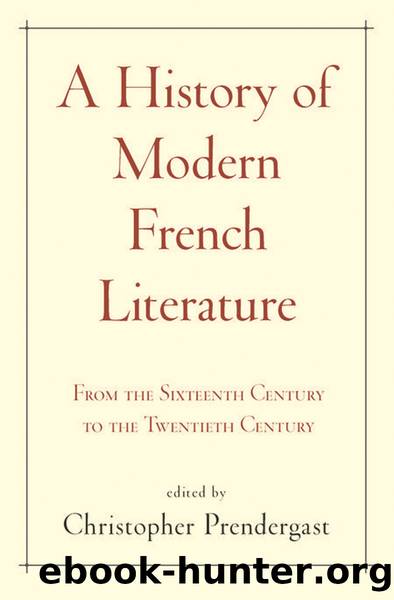A History of Modern French Literature by Unknown

Author:Unknown
Language: eng
Format: epub
Publisher: Princeton University Press
Published: 2017-07-14T16:00:00+00:00
WORKS CITED AND RECOMMENDED FURTHER READING
All translations of passages quoted in this chapter are my own, although excellent English translations of both Beaumarchais and Marivaux are available in the following editions: The Barber of Seville and The Marriage of Figaro, in The Figaro Trilogy, trans. David Coward, Oxford World’s Classics (Oxford: Oxford University Press, 2008); and Marivaux Plays, trans. John Bowen, Michael Sadler, John Walters, Donald Watson, and Nicholas Wright (London: Bloomsbury Methuen Drama), 2004. Before suggesting further reading, I would recommend further listening and viewing. Le Nozze di Figaro (1786), Mozart’s adaptation of Beaumarchais’s Mariage de Figaro, is spectacularly successful in expressing the joyousness that is at the heart of the play. The opera’s libretto was even more heavily censored than was the play, yet all the elements—the celebration of love rather than power, and the privileging of sentiment rather than hierarchy and of community in the place of the exalted ego of the individual—are fully present. Abdellatif Kechiche’s film L’esquive (2004), which appeared in US cinemas under the title Games of Love and Chance, is a fascinating reflection on the role of classical French culture in today’s society. The movie depicts a group of high school students, living in a dreary exurban Parisian housing project, who rehearse and ultimately perform Marivaux’s eponymous play. Kechiche explained that he was drawn to Marivaux both for his linguistic virtuosity (which he sees paralleled in the adolescents’ mastery of their idiosyncratic language), and for his unusual attention to and sympathy with characters from the lower social classes.
For further reading about theater, theatricality, and the relationship among theater, painting, and the novel, see the important studies by Michael Fried, Absorption and Theatricality: Painting and Beholder in the Age of Diderot (Chicago: University of Chicago Press, 1988); and David Marshall, The Surprising Effects of Sympathy: Marivaux, Diderot, Rousseau, and Mary Shelley (Chicago: University of Chicago Press, 1988). To learn more about servants and masters, see Sarah Maza, Servants and Masters in Eighteenth-Century France: The Uses of Loyalty (Princeton, NJ: Princeton University Press, 1984). Maza has also written a wonderful book that explores the importance of private lives, and specifically private scandals, to public, political life in eighteenth-century France; Beaumarchais is an important figure in her analysis: see Private Lives and Public Affairs: The Causes Célèbres of Prerevolutionary France (Berkeley: University of California Press, 1993).
Download
This site does not store any files on its server. We only index and link to content provided by other sites. Please contact the content providers to delete copyright contents if any and email us, we'll remove relevant links or contents immediately.
Kathy Andrews Collection by Kathy Andrews(10573)
The remains of the day by Kazuo Ishiguro(7588)
Spare by Prince Harry The Duke of Sussex(4235)
Paper Towns by Green John(4183)
The Body: A Guide for Occupants by Bill Bryson(3843)
Be in a Treehouse by Pete Nelson(3242)
Harry Potter and the Goblet Of Fire by J.K. Rowling(3105)
Goodbye Paradise(2989)
Never by Ken Follett(2921)
Into Thin Air by Jon Krakauer(2718)
The Remains of the Day by Kazuo Ishiguro(2631)
The Genius of Japanese Carpentry by Azby Brown(2621)
The Cellar by Natasha Preston(2610)
Drawing Shortcuts: Developing Quick Drawing Skills Using Today's Technology by Leggitt Jim(2537)
120 Days of Sodom by Marquis de Sade(2451)
Architecture 101 by Nicole Bridge(2359)
Machine Learning at Scale with H2O by Gregory Keys | David Whiting(2331)
The Man Who Died Twice by Richard Osman(2316)
Industrial Automation from Scratch: A hands-on guide to using sensors, actuators, PLCs, HMIs, and SCADA to automate industrial processes by Olushola Akande(2191)
